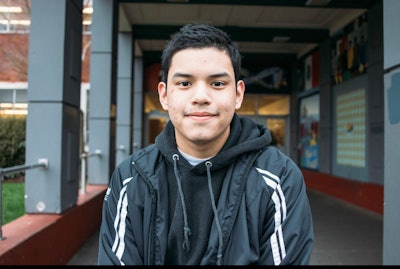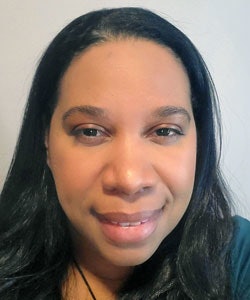 Javier Gomez, student at Portland Community College.
Javier Gomez, student at Portland Community College.
“I didn’t want to create a strain on my grandparents,” said Gomez. “I was in college. I couldn’t get a full-time job that would allow me to help them.”
Gomez wanted to move out so his grandparents could downsize, maybe even retire—but finding affordable housing in Portland as a student was going to be tricky. He didn’t have a rental history or enough money to cover first and last month’s rent. That’s when he was introduced to the Affordable Rents for College Students (ARCS) program, established through collaboration between PCC, Portland State University, various advocacy groups, and the nonprofit College Housing Northwest.
ARCS provides a 50% rent discount to students experiencing housing insecurity or homelessness. The program lowers the cost of monthly utilities, provides free wireless internet, and connects its students with a coordinator to help when they confront barriers to completing their education: financial, personal, or otherwise.
“My experience with ARCS so far has been great,” said Gomez. “It’s alleviated me from thinking about where I’ll get money to cover rent—not having that on your mind all the time helps a lot with school. I was able to concentrate on homework and classes.”
He shared his story at The Hope Center for College, Community, and Justice’s first ever virtual policy summit, which discussed federal, state, and institutional solutions that combat student basic needs insecurity. The Hope Center is a nonprofit organization working to remove the barriers that keep students from degree completion. Their 2020 report found that 39% of surveyed college students experienced food insecurity and almost 50% indicated they had faced housing insecurity. Just under 20% said they had no access to housing at all.
At the summit, policy leaders, advocate groups, nonprofit organizations, educators and students came together to center student voices and experiences, working to confront the myth that college goers are a privileged group that neither need nor deserve financial or wrap-around support.
While Gomez spoke about local housing solutions, another conversation tackled the needs of students whose demographic data is often missing from the conversations around college affordability and feasibility: student parents. Education advocacy groups Higher Learning Advocates and the National Skills Coalition were joined by The Education Trust, a nonprofit working to close opportunity gaps for students of color and from low-income backgrounds, to discuss where federal and state benefits for parenting students fall short.
“To characterize student parents in a general way, they cobble together different supports to make it through higher education,” said Tanya Ang, managing director of advocacy at Higher Learning Advocates. “Supports for student parents are not a given on campuses at this point. That’s changing slowly, bit by bit, but the lack of intentionally designed supports is still a major gap for student parents to even see themselves in the secondary space.”
Two federal programs can be accessed to help low-income student parents: Child Care Access Means Parents in School (CCAMPIS), and the Child Care and Development Fund (CCDF). Dr. Kalani Palmer, an associate professor of professional studies in education at Indiana University of Pennsylvania (IUP), is the project director of IUP’s CCAMPIS program.
 Traci Simmons, associate vice president of diversity, equity, and inclusion at Mt. Hood Community College.
Traci Simmons, associate vice president of diversity, equity, and inclusion at Mt. Hood Community College.
The CCDF program has more funds available, but they come with restrictions like excluding students who attend school online. Because federal funding can fall short, experts said states and institutions need to collect data on their student parents to come up with solutions to bridge the gap.
Increasing the funding available to students will take not just data collection but also a reframing of who attends college in the national mindset.
“A lack of resources is based on bad assumptions baked into policies—that students attending higher education are a privileged class that shouldn’t be eligible for support like this,” said Matt Rasmussen, program coordinator of Youth Experiencing Homelessness at the Oregon Department of Human Services. “How do we combat that narrative successfully?”
Traci Simmons, associate vice president of diversity, equity, and inclusion at Mt. Hood Community College in Gresham, OR, said that the majority of her students do not dream of one day sailing the world on an expensive yacht, but rather are pursuing jobs that give back to their community, and they are passionate about learning. She called for a systems-level conversation to address college affordability.
“Public education has been grossly underfunded forever—as soon as there was desegregation,” said Simmons. “We have to have conversations about how we fund education, how we create pathways from the starting point of [moving] under-resourced young people to a comfortable life, contributing to the whole betterment of our society.”
Liann Herder can be reached at [email protected].
















